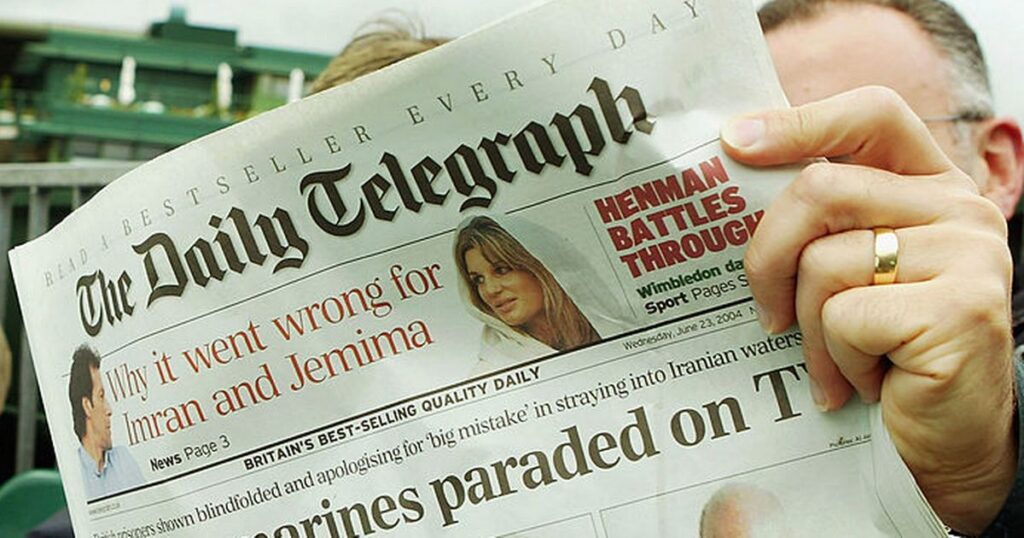Conrad Black, a pivotal figure in the media industry, is contemplating a significant return to The Telegraph. This move, involving collaboration with Dovid Efune, could redefine the paper’s future.
This potential partnership is under scrutiny within media circles, given Black’s historical connection with The Telegraph and Efune’s current role at The New York Sun.
Conrad Black’s Renewed Interest
Lord Conrad Black, a renowned media mogul, is reportedly considering re-entering the British media landscape by supporting a bid for The Telegraph. His potential return marks a significant development, given his historic ties to the publication, which he owned for nearly two decades through his company, Hollinger International.
An insider close to the situation disclosed that Black is in talks with Dovid Efune, the owner of The New York Sun, to potentially back Efune’s bid for The Telegraph. Efune, who has expressed an interest in acquiring the broadsheet, believes Black’s experience and previous association with the newspaper could significantly bolster the bid.
The Background of the Bid
Dovid Efune, at the helm of The New York Sun, is spearheading an effort to acquire The Telegraph, a leading British broadsheet with a storied history. Efune is reportedly seeking influential backers to strengthen his position in this competitive bidding process.
The Telegraph has been in a state of flux, particularly following the Barclay brothers’ default on a £1 billion loan, which led to Lloyds Banking Group’s intervention. The ownership of The Telegraph has since been under the control of Redbird IMI, who initiated a bidding process that has garnered international interest.
Historical Context
The current situation echoes past events when The Telegraph changed hands. Initially, Black acquired a stake in the paper in 1985 and eventually took full control. However, in 2004, despite his efforts, Black could not prevent the sale to the Barclay brothers, marking a significant shift in the paper’s leadership and direction.
The sale of The Spectator, a sister publication of The Telegraph, to Sir Paul Marshall’s OQS Media adds another layer to the ongoing narrative. This £100 million deal signifies a shift in the media ownership landscape, further complicating the potential acquisition of The Telegraph. Redbird IMI’s management of the sale reflects a broader strategy following national security concerns raised by the UK government.
The Strategic Implications
From a strategic perspective, Black’s involvement in the acquisition represents more than financial investment; it suggests a potential shift in the editorial direction and operational strategy of The Telegraph. His previous ownership was characterised by a strong editorial voice and an expansion of the paper’s influence.
The auction process is of particular interest to several international players, indicating the strategic value that The Telegraph holds as a reputable media entity. The outcome of this process could redefine the future of British media, depending on the new ownership and management strategies implemented post-acquisition.
International Bidders and Market Interest
The ongoing auction for The Telegraph has attracted several international bidders, highlighting its global significance. This interest underscores the paper’s reputation and potential for international influence under new leadership.
Potential bidders recognise that acquiring a publication of The Telegraph’s stature could serve to enhance their media portfolio and extend their reach within Europe and beyond. The competitive bidding process promises a significant transformation in the media landscape, contingent on the outcomes and decisions made by current and potential stakeholders.
Future Prospects
The future of The Telegraph, post-acquisition, hinges on its new ownership’s ability to navigate the challenges of the modern media landscape. The involvement of experienced media figures like Lord Black suggests a potential for revitalisation and strategic growth.
A successful bid, backed by substantial capital and strategic vision, could position The Telegraph as a leading force in digital journalism, addressing contemporary issues while honouring its historical legacy. The outcome of this sale could very well set a precedent for similar future transactions in the media industry.
Conclusion
The potential backing of Lord Conrad Black in the bid for The Telegraph underscores the paper’s ongoing importance and allure in the media world. As the auction progresses, the involvement of influential figures and international interests highlights the dynamic and competitive nature of media acquisitions.
The involvement of figures like Conrad Black indicates The Telegraph’s enduring influence and attractiveness. The bidding process continues to draw notable interest, promising potential shifts in the media landscape.


